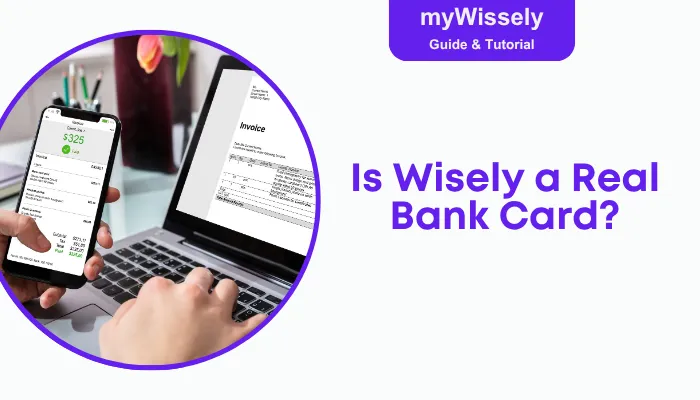I’ve used Wisely for years, and I’m thrilled to guide you through the question, “Is Wisely a Real Bank Card?” Wisely, with its myWisely app, is a financial tool that sparks curiosity about its status as a bank card.

Let’s dive into the details, and if you’re ready to manage your account firsthand, the myWisely login portal is the perfect place to start.

What Is Wisely?
Let’s dive into what Wisely really is. I’ll walk you through its core functions and clear up any confusion about its role in your financial life.
First, is Wisely a real bank card? That’s a common question, and the answer is no, but it works a lot like one. Wisely is not a bank; it’s a prepaid debit card and payroll card service designed to help you manage your money conveniently. It’s offered through ADP, a trusted name in payroll services.
There are two types of Wisely cards:
- Wisely Pay, which is often issued by employers for direct deposit of your paycheck
- Wisely Direct, a general-use prepaid card that you can use to shop, pay bills, or withdraw cash
I’ve seen friends use Wisely Pay for their gig work paychecks, and it’s a lifesaver, giving them fast access to their money without needing a traditional bank account. So while it’s not technically a bank card, it functions much like one in your daily financial life.
Is Wisely a Real Bank?
Here’s the big question: Is Wisely a Real Bank Card? I’ll break it down for you and share why I think it’s a solid option despite not being a bank.
The short answer is no, Wisely is not a bank. It’s a financial service offering prepaid debit cards through ADP, backed by FDIC-insured banks like Pathward. Unlike traditional banks with branches and full services (think Chase or Wells Fargo), Wisely operates more like fintech platforms such as Chime or Cash App.
I once considered Wisely for my side hustle income because I wanted something simpler than a bank account, and it fit the bill.
Here’s how it stacks up:
- Traditional Banks: Offer checking, savings, loans, and physical branches. They often pay interest on savings.
- Fintech (e.g., Chime, Wisely): Focus on digital prepaid cards or mobile banking. No branches, no loans, no interest on balances.
- FDIC Insurance: Wisely partners ensure your funds are insured up to $250,000, just like a bank. This gave me peace of mind when I loaded my card.
To use Wisely effectively, treat it as a spending tool, not a savings account. Keep only what you need for transactions to avoid inactivity fees. It’s safe, legitimate, and backed by FDIC insurance, but it’s not a full-fledged bank.
In summary, Wisely offers bank-like features without being a bank, making it great for specific needs. Let’s see how it works in practice.
How Does Wisely Work?
Let’s get practical, how does Wisely function in your daily life? I’ll walk you through the nuts and bolts so you can hit the ground running.
Wisely is designed for ease, whether you’re getting paid or managing everyday expenses. You can fund your Wisely card in a few ways: direct deposit from an employer (great for payroll), cash reloads at places like Walmart, or transfers from another account. I’ve reloaded mine at a retailer when I needed quick cash for a weekend trip, it was super straightforward.
Here’s what you can do with Wisely:
- Spending: Use it anywhere Visa or Mastercard is accepted (online, in-store, or at ATMs).
- Mobile App: Track spending, check balances, and set budgeting goals. The app’s intuitive, though I wish it had more alerts.
- Bill Pay: Pay utilities or subscriptions directly from the card.
- Cash Access: Withdraw at in-network ATMs (check for fees at out-of-network ones).
Potential Fees (always check the latest terms):
- ATM withdrawals: Free at in-network ATMs; $2–$3 for others.
- Inactivity fee: Around $4/month after 90 days of no activity.
- Reload fees: Vary by retailer (e.g., $4.95 at some stores).
To maximize Wisely, use direct deposit to avoid reload fees and stick to in-network ATMs. Download the app to stay on top of your spending. That’s the mechanics of Wisely. Next, let’s weigh its strengths and weaknesses.
Pros and Cons of Wisely
Every financial tool has upsides and downsides. I’ll walk you through Wisely’s pros and cons so you can decide if it’s right for you.
Pros
I’ve used Wisely myself, and here’s what I love about it:
- No Credit Check: Perfect if your credit’s shaky or you’re unbanked. I recommended it to a friend who couldn’t open a traditional account.
- Early Direct Deposit: Some employers offer pay up to two days early, which saved me during tight months.
- Budgeting Tools: The mobile app lets you categorize spending, helping you stick to a budget.
- FDIC-Insured: Your money’s safe up to $250,000 through Wisely’s bank partners.
Cons
But it’s not perfect, here’s what I’ve noticed:
- Fees: ATM fees ($2–$3 out-of-network) and inactivity fees ($4/month) can add up. I got hit once for forgetting to use my card.
- No Interest: Unlike savings accounts, Wisely doesn’t earn interest, so your money just sits there.
- Limited Support: Customer service can be slow. I had to wait a day for a response about a transaction issue.
To make Wisely work for you, use it actively to avoid inactivity fees, stick to in-network ATMs, and treat it as a spending tool, not a savings account. Now that you know the trade-offs, let’s compare Wisely to traditional banks.
Wisely vs. Traditional Bank Accounts
Wondering how Wisely stacks up against a traditional bank account? I’ll break it down for you, drawing from my own experience switching between the two.
Wisely and traditional banks serve different purposes. A bank account (like at Bank of America) offers full services, while Wisely is a streamlined prepaid card. Here’s a comparison:
| Feature | Wisely | Traditional Bank |
|---|---|---|
| Account Type | Prepaid Debit Card | Checking/Savings |
| Interest Earnings | None | Yes (on savings accounts) |
| Overdraft Protection | Rarely available | Often available |
| Branch Access | None (online-only) | Physical branches available |
| FDIC Insurance | Yes (via partner banks) | Yes |
| Fees | ATM, inactivity fees | Monthly or overdraft fees |
I used a traditional bank for years, but tried Wisely when I started freelancing. I loved the simplicity, no overdraft worries, but I missed earning interest on my savings.
Wisely shines for unbanked folks, gig workers, or anyone avoiding bank fees. To use it best, pair it with a high-yield savings account elsewhere for long-term savings.
Is Wisely Safe and Legitimate?
Safety is a top concern with any financial tool. I’ll walk you through why Wisely is a legitimate and secure option.
Wisely is absolutely legit, backed by ADP, a trusted name in payroll services. Your funds are held by FDIC-insured banks (like Pathward), meaning they’re protected up to $250,000.
I felt secure using Wisely because of this insurance, especially after a friend lost money with a sketchy prepaid card years ago. The mobile app uses encryption, and features like fraud alerts and card-locking add extra protection.
Alternatives to Wisely
Not sure if Wisely is your best bet? I’ll walk you through some solid alternatives to help you find the right fit.
While Wisely is great, other prepaid cards and fintech options might suit you better. Here’s a rundown of top competitors:
- Chime: A mobile banking platform with no monthly fees, early direct deposit, and a savings account with interest. Great if you want more banking features.
- Cash App Card: A prepaid debit card tied to Cash App. Free ATM withdrawals with direct deposit, but no savings account. I use it for quick peer-to-peer payments.
- Bluebird by American Express: A prepaid card with low fees and bill pay features. Ideal for budgeting but lacks early direct deposit.
- Current: Another fintech card with early direct deposit and savings “pods” (no interest). Good for tech-savvy users.
| Platform | Fees | Early Direct Deposit | Interest on Balances |
|---|---|---|---|
| Wisely | ATM, inactivity | Yes (sometimes) | No |
| Chime | None (in-network ATMs) | Yes | Yes (savings) |
| Cash App Card | None (with direct deposit) | Yes | No |
| Bluebird | Low (varies) | No | No |
| Current | ATM, monthly | Yes | No |
To choose, consider your priorities. If you want interest or robust banking, try Chime. For simplicity, stick with Wisely or Bluebird. Check each platform’s fee schedule and set up direct deposit to minimize costs.
That’s the competitive landscape. You’re now equipped to decide if Wisely or an alternative works best for you.
Conclusion
I’ve shared my journey to answer, Is Wisely a Real Bank Card?, Wisely isn’t a traditional bank card, it’s a prepaid card that functions like one for shopping, payroll, and money management. With the myWisely app, I control my finances without a bank account.
I encourage you to try Wisely if you want flexibility and security. It’s not a bank card, but it’s a powerful tool that fits my life perfectly. Here’s to smarter money management!
